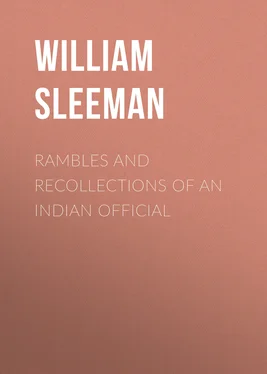William Sleeman - Rambles and Recollections of an Indian Official
Здесь есть возможность читать онлайн «William Sleeman - Rambles and Recollections of an Indian Official» — ознакомительный отрывок электронной книги совершенно бесплатно, а после прочтения отрывка купить полную версию. В некоторых случаях можно слушать аудио, скачать через торрент в формате fb2 и присутствует краткое содержание. Жанр: Путешествия и география, История, foreign_edu, foreign_antique, foreign_prose, на английском языке. Описание произведения, (предисловие) а так же отзывы посетителей доступны на портале библиотеки ЛибКат.
- Название:Rambles and Recollections of an Indian Official
- Автор:
- Жанр:
- Год:неизвестен
- ISBN:нет данных
- Рейтинг книги:4 / 5. Голосов: 1
-
Избранное:Добавить в избранное
- Отзывы:
-
Ваша оценка:
- 80
- 1
- 2
- 3
- 4
- 5
Rambles and Recollections of an Indian Official: краткое содержание, описание и аннотация
Предлагаем к чтению аннотацию, описание, краткое содержание или предисловие (зависит от того, что написал сам автор книги «Rambles and Recollections of an Indian Official»). Если вы не нашли необходимую информацию о книге — напишите в комментариях, мы постараемся отыскать её.
Rambles and Recollections of an Indian Official — читать онлайн ознакомительный отрывок
Ниже представлен текст книги, разбитый по страницам. Система сохранения места последней прочитанной страницы, позволяет с удобством читать онлайн бесплатно книгу «Rambles and Recollections of an Indian Official», без необходимости каждый раз заново искать на чём Вы остановились. Поставьте закладку, и сможете в любой момент перейти на страницу, на которой закончили чтение.
Интервал:
Закладка:
'I understand, Kehrī Singh', said I, 'that certain men among the Gonds of the jungle, towards the source of the Nerbudda, eat human flesh. Is it so?'
'No, sir; the men never eat people, but the Gond women do.'
'Where?'
'Everywhere, sir; there is not a parish, nay, a village, among the Gonds, in which you will not find one or more such women.'
'And how do they eat people?'
'They eat their livers, sir.'
'Oh, I understand; you mean witches?'
'Of course! Who ever heard of other people eating human beings?'
'And you really still think, in spite of all that we have done and said, that there are such things as witches?'
'Of course we do—do not we find instances of it every day? European gentlemen are too apt to believe that things like this are not to be found here, because they are not to be found in their own country. Major Wardlow, when in charge of the Seonī district, denied the existence of witchcraft for a long time, but he was at last convinced.'
'How?'
'One of his troopers, one morning after a long march, took some milk for his master's breakfast from an old woman without paying for it. Before the major had got over his breakfast the poor trooper was down upon his back, screaming from the agony of internal pains. We all knew immediately that he had been bewitched, and recommended the major to send for some one learned in these matters to find out the witch. He did so, and, after hearing from the trooper the story about the milk, this person at once declared that the woman from whom he got it was the criminal. She was searched for, found, and brought to the trooper, and commanded to cure him. She flatly denied that she had herself conjured him; but admitted that her household gods might, unknown to her, have punished him for his wickedness. This, however, would not do. She was commanded to cure the man, and she set about collecting materials for the "pūjā" (worship); and before she could get quite through the ceremonies, all his pains had left him. Had we not been resolute with her, the man must have died before evening, so violent were his torments.'
'Did not a similar case occur to Mr. Fraser at Jubbulpore?'
'A "chaprāsī" 145 145 An orderly, or official messenger, who wears a 'chaprās', or badge of office.
of his, while he had charge of the Jubbulpore district, was sent out to Mandlā 146 146 On the Nerbudda, fifty miles south-east of Jubbulpore.
with a message of some kind or other. He took a cock from an old Gond woman without paying for it, and, being hungry after a long journey, ate the whole of it in a curry. He heard the woman mutter something, but being a raw, unsuspecting young man, he thought nothing of it, ate his cock, and went to sleep. He had not been asleep three hours before he was seized with internal pains, and the old cock was actually heard crowing in his belly. He made the best of his way back to Jubbulpore, several stages, and all the most skilful men were employed to charm away the effect of the old woman's spell, but in vain. He died, and the cock never ceased crowing at intervals up to the hour of his death.'
'And was Mr. Fraser convinced?'
'I never heard, but suppose he must have been.'
'Who ate the livers of the victims? The witches themselves, or the evil spirits with whom they had dealings?'
'The evil spirits ate the livers; but they are set on to do so by the witches, who get them into their power by such accursed sacrifices and offerings. They will often dig up young children from their graves, bring them to life, and allow these devils to feed upon their livers, as falconers allow their hawks to feed on the breasts of pigeons. You "sāhib lōg" (European gentlemen) will not believe all this, but it is, nevertheless, all very true.' 147 147 Of the supposed powers and dispositions of witches among the Romans we have horrible pictures in the 5th Ode of the 6th Book of Horace, and in the 6th Book of Lucan's Pharsalia . [W. H. S.] The reference to Horace should be to the 5th Epode. The passage in the Pharsalia , Book VI, lines 420-830, describes the proceedings of Thessalian witches.
The belief in sorcery among these people owes its origin, in a great measure, to the diseases of the liver and spleen to which the natives, and particularly the children, are much subject in the jungly parts of Central India. From these affections children pine away and die, without showing any external marks of disease. Their death is attributed to witchcraft, and any querulous old woman, who has been in the habit of murmuring at slights and ill treatment in the neighbourhood, is immediately set down as the cause. Men who practise medicine among them are very commonly supposed to be at the same time wizards. Seeking to inspire confidence in their prescriptions by repeating prayers and incantations over the patient, or over the medicine they give him, they make him believe that they derive aid from supernatural power; and the patient concludes that those who can command these powers to cure can, if they will, command them to destroy. He and his friends believe that the man who can command these powers to cure one individual can command them to cure any other; and, if he does not do so, they believe that it arises from a desire to destroy the patient. I have, in these territories, known a great many instances of medical practitioners having been put to death for not curing young people for whom they were required to prescribe. Several cases have come before me as a magistrate in which the father has stood over the doctor with a drawn sword by the side of the bed of his child, and cut him down and killed him the moment the child died, as he had sworn to do when he found the patient sinking under his prescriptions. 148 148 Such awkward incidents of medical practice are not heard of nowadays.
The town of Jubbulpore contains a population of twenty thousand souls, 149 149 The population of Jabalpur (including cantonments) has increased steadily, and in 1911 was 100,651, as compared with 84,556 in 1891, and 76,023 in 1881.
and they all believed in this story of the cock. I one day asked a most respectable merchant in the town, Nādū Chaudhrī, how the people could believe in such things, when he replied that he had no doubt witches were to be found in every part of India, though they abounded most, no doubt, in the central parts of it, and that we ought to consider ourselves very fortunate in having no such things in England. 'But', added he, 'of all countries that between Mandlā and Katāk (Cuttack) 150 150 Katāk, or Cuttack, a district, with town of same name, in Orissa.
is the worst for witches. I had once occasion to go to the city of Ratanpur 151 151 In the Bilāspur district of the Central Provinces. The distance in a direct line between Mandlā and Katāk is about 400 miles.
on business, and was one day, about noon, walking in the market-place and eating a very fine piece of sugar-cane. In the crowd I happened, by accident, to jostle an old woman as she passed me. I looked back, intending to apologize for the accident, and heard her muttering indistinctly as she passed on. Knowing the propensities of these old ladies, I became somewhat uneasy, and on turning round to my cane I found, to my great terror, that the juice had been all turned to blood . Not a minute had elapsed, such were the fearful powers of this old woman. I collected my followers, and, leaving my agents there to settle my accounts, was beyond the boundaries of the old wretch's influence before dark; had I remained, nothing could have saved me. I should certainly have been a dead man before morning. It is well known', said the old gentleman, 'that their spells and curses can only reach a certain distance, ten or twelve miles; and, if you offend one of them, the sooner you place that distance between you the better.'
Интервал:
Закладка:
Похожие книги на «Rambles and Recollections of an Indian Official»
Представляем Вашему вниманию похожие книги на «Rambles and Recollections of an Indian Official» списком для выбора. Мы отобрали схожую по названию и смыслу литературу в надежде предоставить читателям больше вариантов отыскать новые, интересные, ещё непрочитанные произведения.
Обсуждение, отзывы о книге «Rambles and Recollections of an Indian Official» и просто собственные мнения читателей. Оставьте ваши комментарии, напишите, что Вы думаете о произведении, его смысле или главных героях. Укажите что конкретно понравилось, а что нет, и почему Вы так считаете.












